Engage NY Eureka Math 4th Grade Module 5 Lesson 33 Answer Key
Eureka Math Grade 4 Module 5 Lesson 33 Sprint Answer Key
A
Change Mixed Numbers to Fractions
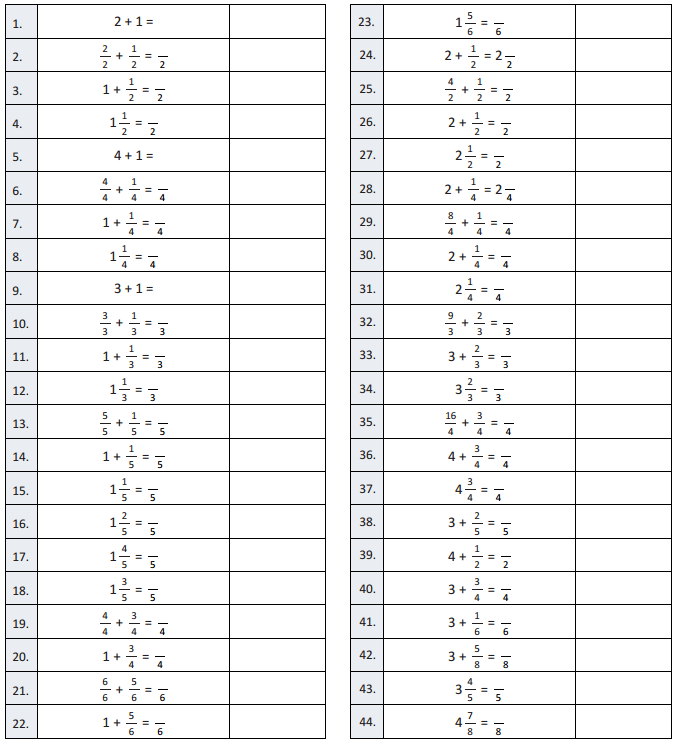
Answer:
2 + 1 = 3, 2/2 + 1/2 = 3/2, 1 + 1/2 = 3/2, 1(1/2) = 3/2, 4 + 1 = 5, 4/4 + 1/4 = 5/4, 1 + 1/4 = 5/4, 1(1/4) = 5/4, 3 + 1 = 4, 3/3 + 1/3 = 4/3, 1 + 1/3 = 4/3, 1(1/3) = 4/3, 5/5 + 1/5 = 6/5, 1 + 1/5 = 6/5, 1(1/5) = 6/5, 1(2/5) = 7/5, 1(4/5) = 9/5, 1(3/5) = 8/5, 4/4 +3/4 = 7/4, 1 + 3/4 = 4/4, 6/6 + 5/6 = 11/6, 1 + 5/6 = 11/6, 1(5/6) = 11/6, 2 + 1/2 = 5/2, 4/2 + 1/2 = 5/2, 2 + 1/2 = 5/2, 2(1/2) = 5/2, 2 + 1/4 = 2(1/4), 8/4 + 1/4 = 9/4, 2 + 1/4 = 9/4, 2(1/4) = 9/4, 9/3 + 2/3 = 11/3, 3 + 2/3 = 11/3, 3(2/3) = 11/3, 16/4 + 3/4 = 19/4, 4 + 3/4 = 19/4, 4(3/4) = 19/4, 3 + 2/5 = 17/5, 4 + 1/2 = 9/2, 3 + 3/4 = 15/4, 3 + 1/6 = 19/6, 3 + 5/8 = 29/8, 3(4/5) = 19/5, 4(7/8) = 39/8.
Explanation:
In the above-given question,
given that,
change mixed numbers to fractions.
2 + 1 = 3, 2/2 + 1/2 = 3/2, 1 + 1/2 = 3/2, 1(1/2) = 3/2, 4 + 1 = 5, 4/4 + 1/4 = 5/4, 1 + 1/4 = 5/4, 1(1/4) = 5/4, 3 + 1 = 4, 3/3 + 1/3 = 4/3, 1 + 1/3 = 4/3, 1(1/3) = 4/3, 5/5 + 1/5 = 6/5, 1 + 1/5 = 6/5, 1(1/5) = 6/5, 1(2/5) = 7/5, 1(4/5) = 9/5, 1(3/5) = 8/5, 4/4 +3/4 = 7/4, 1 + 3/4 = 4/4, 6/6 + 5/6 = 11/6, 1 + 5/6 = 11/6, 1(5/6) = 11/6, 2 + 1/2 = 5/2, 4/2 + 1/2 = 5/2, 2 + 1/2 = 5/2, 2(1/2) = 5/2, 2 + 1/4 = 2(1/4), 8/4 + 1/4 = 9/4, 2 + 1/4 = 9/4, 2(1/4) = 9/4, 9/3 + 2/3 = 11/3, 3 + 2/3 = 11/3, 3(2/3) = 11/3, 16/4 + 3/4 = 19/4, 4 + 3/4 = 19/4, 4(3/4) = 19/4, 3 + 2/5 = 17/5, 4 + 1/2 = 9/2, 3 + 3/4 = 15/4, 3 + 1/6 = 19/6, 3 + 5/8 = 29/8, 3(4/5) = 19/5, 4(7/8) = 39/8.
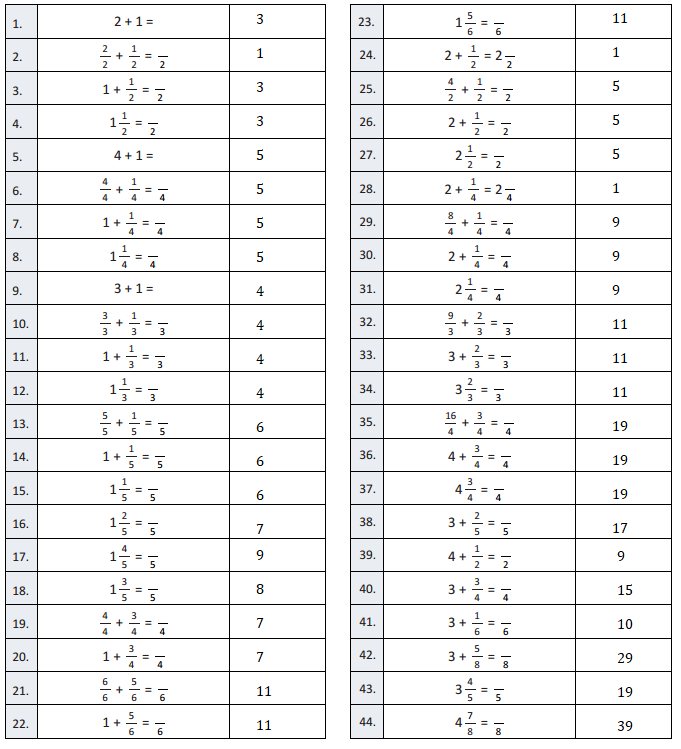
Question 1.
2 + 1 = 3.
Answer:
3 = 2 + 1.
Explanation:
In the above-given question,
given that,
change mixed numbers to fractions.
3 = 2 + 1.
2 + 1 = 3.
Question 2.
\(\frac{2}{2}\) + \(\frac{1}{2}\) = \(\frac{1}{2}\)
Answer:
2/2 = 1/2 + 1/2.
Explanation:
In the above-given question,
given that,
change mixed numbers to fractions.
2/2 = 1/2 + 1/2.
1 + 1 = 2.
1/2 + 1/2 = 2/2.
Question 3.
1 + \(\frac{1}{2}\) = \(\frac{3}{2}\)
Answer:
3/2 = 1 + 1/2.
Explanation:
In the above-given question,
given that,
change mixed numbers to fractions.
3/2 = 1 + 1/2.
2 + 1 = 3.
1 + 1/2 = 3/2.
Question 4.
1\(\frac{1}{2}\) = \(\frac{3}{2}\)
Answer:
3/2 = 1 + 1/2.
Explanation:
In the above-given question,
given that,
change mixed numbers to fractions.
3/2 = 1 + 1/2.
2 + 1 = 3.
1 + 1/2 = 3/2.
Question 5.
4 + 1 = 5.
Answer:
5 = 4 + 1.
Explanation:
In the above-given question,
given that,
change mixed numbers to fractions.
5 = 4 + 1.
4 + 1 = 5.
Question 6.
\(\frac{4}{4}\) + \(\frac{1}{4}\) = \(\frac{3}{4}\)
Answer:
4/4 = 1/4 + 3/4.
Explanation:
In the above-given question,
given that,
change mixed numbers to fractions.
4/4 = 1/4 + 3/4.
3 + 1 = 4.
1/4 + 3/4 = 4/4.
Question 7.
1 + \(\frac{1}{4}\) = \(\frac{5}{4}\)
Answer:
5/4 = 1 + 1/4.
Explanation:
In the above-given question,
given that,
change mixed numbers to fractions.
5/4 = 1 + 1/4.
4 + 1 = 5.
1 + 1/4 = 5/4.
Question 8.
1\(\frac{1}{4}\) = \(\frac{5}{4}\)
Answer:
5/4 = 1 + 1/4.
Explanation:
In the above-given question,
given that,
change mixed numbers to fractions.
5/4 = 1 + 1/4.
4 + 1 = 5.
1 + 1/4 = 5/4.
Question 9.
3 + 1 = 4.
Answer:
4 = 3 + 1.
Explanation:
In the above-given question,
given that,
change mixed numbers to fractions.
4 = 3 + 1.
3 + 1 = 4.
Question 10.
\(\frac{3}{3}\) + \(\frac{1}{3}\) = \(\frac{1}{3}\)
Answer:
3/3 = 1/3 + 1/3.
Explanation:
In the above-given question,
given that,
change mixed numbers to fractions.
3/3 = 1/3 + 1/3.
2 + 1 = 3.
1/3 + 1/3 = 3/3.
Question 11.
1 + \(\frac{1}{3}\) = \(\frac{4}{3}\)
Answer:
4/3 = 1 + 1/3.
Explanation:
In the above-given question,
given that,
change mixed numbers to fractions.
4/3 = 1 + 1/3.
3 + 1 = 4.
1 + 1/3 = 4/3.
Question 12.
1\(\frac{1}{3}\) = \(\frac{4}{3}\)
Answer:
4/3 = 1 + 1/3.
Explanation:
In the above-given question,
given that,
change mixed numbers to fractions.
4/3 = 1 + 1/3.
3 + 1 = 4.
1 + 1/3 = 4/3.
Question 13.
\(\frac{5}{5}\) + \(\frac{1}{5}\) = \(\frac{4}{5}\)
Answer:
5/5 = 1/5 + 4/5.
Explanation:
In the above-given question,
given that,
change mixed numbers to fractions.
5/5 = 1/5 + 4/5.
4 + 1 = 5.
1/5 + 4/5 = 5/5.
Question 14.
1 + \(\frac{1}{5}\) = \(\frac{6}{5}\)
Answer:
6/5 = 1 + 1/5.
Explanation:
In the above-given question,
given that,
change mixed numbers to fractions.
6/5 = 1 + 1/5.
5 + 1 = 6.
1 + 1/5 = 6/5.
Question 15.
1\(\frac{1}{5}\) = \(\frac{6}{5}\)
Answer:
6/5 = 1 + 1/5.
Explanation:
In the above-given question,
given that,
change mixed numbers to fractions.
6/5 = 1 + 1/5.
5 + 1 = 6.
1 + 1/5 = 6/5.
Question 16.
1\(\frac{2}{5}\) = \(\frac{7}{5}\)
Answer:
7/5 = 1 + 2/5.
Explanation:
In the above-given question,
given that,
change mixed numbers to fractions.
7/5 = 1 + 2/5.
6 + 1 = 7.
1 + 2/5 = 7/5.
Question 17.
1\(\frac{4}{5}\) = \(\frac{9}{5}\)
Answer:
9/5 = 1 + 4/5.
Explanation:
In the above-given question,
given that,
change mixed numbers to fractions.
9/5 = 1 + 4/5.
8 + 1 = 9.
1 + 4/5 = 9/5.
Question 18.
1\(\frac{3}{5}\) = \(\frac{8}{5}\)
Answer:
8/5 = 1 + 3/5.
Explanation:
In the above-given question,
given that,
change mixed numbers to fractions.
8/5 = 1 + 3/5.
7 + 1 = 8.
1 + 3/5 = 8/5.
Question 19.
\(\frac{4}{4}\) + \(\frac{3}{4}\) = \(\frac{1}{4}\)
Answer:
4/4 = 3/4 + 1/4.
Explanation:
In the above-given question,
given that,
change mixed numbers to fractions.
4/4 = 3/4 + 1/4.
3 + 1 = 4.
3/4 + 1/4 = 4/4.
Question 20.
1 + \(\frac{3}{4}\) = \(\frac{7}{4}\)
Answer:
7/4 = 1 + 3/4.
Explanation:
In the above-given question,
given that,
change mixed numbers to fractions.
7/4 = 1 + 3/4.
6 + 1 = 7.
1 + 3/4 = 7/4.
Question 21.
\(\frac{6}{6}\) + \(\frac{5}{6}\) = \(\frac{1}{6}\)
Answer:
6/6 = 5/6 + 1/6.
Explanation:
In the above-given question,
given that,
change mixed numbers to fractions.
6/6 = 5/6 + 1/6.
5 + 1 = 6.
5/6 + 1/6 = 6/6.
Question 22.
1 + \(\frac{5}{6}\) = \(\frac{11}{6}\)
Answer:
11/6 = 1 + 5/6.
Explanation:
In the above-given question,
given that,
change mixed numbers to fractions.
11/6 = 1 + 5/6.
10 + 1 = 11.
1 + 5/6 = 11/6.
Question 23.
1\(\frac{5}{6}\) = \(\frac{11}{6}\)
Answer:
11/6 = 1 + 5/6.
Explanation:
In the above-given question,
given that,
change mixed numbers to fractions.
11/6 = 1 + 5/6.
10 + 1 = 11.
1 + 5/6 = 11/6.
Question 24.
2 + \(\frac{1}{2}\) = 2\(\frac{1}{2}\)
Answer:
5/2 = 2 + 1/2.
Explanation:
In the above-given question,
given that,
change mixed numbers to fractions.
5/2 = 2 + 1/2.
4 + 1 = 5.
2 + 1/2 = 5/2.
Question 25.
\(\frac{4}{2}\) + \(\frac{1}{2}\) = \(\frac{3}{2}\)
Answer:
4/2 = 1/2 + 3/2.
Explanation:
In the above-given question,
given that,
change mixed numbers to fractions.
4/2 = 1/2 + 3/2.
3 + 1 = 4.
1/2 + 3/2 = 4/2.
Question 26.
2 + \(\frac{1}{2}\) = \(\frac{5}{2}\)
Answer:
5/2 = 2 + 1/2.
Explanation:
In the above-given question,
given that,
change mixed numbers to fractions.
5/2 = 2 + 1/2.
4 + 1 = 5.
2 + 1/2 = 5/2.
Question 27.
2\(\frac{1}{2}\) = \(\frac{5}{2}\)
Answer:
5/2 = 2 + 1/2.
Explanation:
In the above-given question,
given that,
change mixed numbers to fractions.
5/2 = 2 + 1/2.
4 + 1 = 5.
2 + 1/2 = 5/2.
Question 28.
2 + \(\frac{1}{4}\) = 2\(\frac{1}{4}\)
Answer:
9/4 = 2 + 1/4.
Explanation:
In the above-given question,
given that,
change mixed numbers to fractions.
9/4 = 2 + 1/4.
8 + 1 = 9.
2 + 1/4 = 9/4.
Question 29.
\(\frac{8}{4}\) + \(\frac{1}{4}\) = \(\frac{7}{4}\)
Answer:
8/4 = 1/4 + 7/4.
Explanation:
In the above-given question,
given that,
change mixed numbers to fractions.
8/4 = 1/4 + 7/4.
7 + 1 = 8.
1/4 + 7/4 = 8/4.
Question 30.
2 + \(\frac{1}{4}\) = \(\frac{9}{4}\)
Answer:
9/4 = 2 + 1/4.
Explanation:
In the above-given question,
given that,
change mixed numbers to fractions.
9/4 = 2 + 1/4.
8 + 1 = 9.
2 + 1/4 = 9/4.
Question 31.
2\(\frac{1}{4}\) = \(\frac{9}{4}\)
Answer:
9/4 = 2 + 1/4.
Explanation:
In the above-given question,
given that,
change mixed numbers to fractions.
9/4 = 2 + 1/4.
9 + 1 = 10.
2 + 1/4 = 9/4.
Question 32.
\(\frac{9}{3}\) + \(\frac{2}{3}\) = \(\frac{7}{3}\)
Answer:
9/3 = 2/3 + 7/3.
Explanation:
In the above-given question,
given that,
change mixed numbers to fractions.
9/3 = 2/3 + 7/3.
8 + 1 = 9.
2/3 + 7/3 = 9/3.
Question 33.
3 + \(\frac{2}{3}\) = \(\frac{11}{3}\)
Answer:
11/3 = 3 + 2/3.
Explanation:
In the above-given question,
given that,
change mixed numbers to fractions.
11/3 = 3 + 2/3.
10 + 1 = 11.
3 + 2/3 = 11/3.
Question 34.
3\(\frac{2}{3}\) = \(\frac{11}{3}\)
Answer:
11/3 = 3 + 2/3.
Explanation:
In the above-given question,
given that,
change mixed numbers to fractions.
11/3 = 3 + 2/3.
10 + 1 = 11.
3 + 2/3 = 11/3.
Question 35.
\(\frac{16}{4}\) + \(\frac{3}{4}\) = \(\frac{13}{4}\)
Answer:
16/4 = 3/4 + 13/4.
Explanation:
In the above-given question,
given that,
change mixed numbers to fractions.
16/4 = 3/4 + 13/4.
13 + 3 = 16.
3/4 + 13/4 = 16/4.
Question 36.
4 + \(\frac{3}{4}\) = \(\frac{19}{4}\)
Answer:
19/4 = 4 + 3/4.
Explanation:
In the above-given question,
given that,
change mixed numbers to fractions.
19/4 = 4 + 3/4.
10 + 9 = 19.
4 + 3/4 = 19/4.
Question 37.
4\(\frac{3}{4}\) = \(\frac{19}{4}\)
Answer:
19/4 = 4 + 3/4.
Explanation:
In the above-given question,
given that,
change mixed numbers to fractions.
19/4 = 4 + 3/4.
10 + 9 = 19.
4 + 3/4 = 19/4.
Question 38.
3 + \(\frac{2}{5}\) = \(\frac{17}{5}\)
Answer:
17/5 = 3 + 2/5.
Explanation:
In the above-given question,
given that,
change mixed numbers to fractions.
17/5 = 3 + 2/5.
10 + 7 = 17.
3 + 2/5 = 17/5.
Question 39.
4 + \(\frac{1}{2}\) = \(\frac{9}{2}\)
Answer:
9/2 = 4 + 1/2.
Explanation:
In the above-given question,
given that,
change mixed numbers to fractions.
9/2 = 4 + 1/2.
8 + 1 = 9.
4 + 1/2 = 9/2.
Question 40.
3 + \(\frac{3}{4}\) = \(\frac{15}{4}\)
Answer:
15/4 = 3 + 3/4.
Explanation:
In the above-given question,
given that,
change mixed numbers to fractions.
15/4 = 3 + 3/4.
10 + 5 = 15.
3 + 3/4 = 15/4.
Question 41.
3 + \(\frac{1}{6}\) = \(\frac{10}{6}\)
Answer:
10/6 = 3 + 1/6.
Explanation:
In the above-given question,
given that,
change mixed numbers to fractions.
10/6 = 3 + 1/6.
1 + 9 = 10.
3 + 1/6 = 10/6.
Question 42.
3 + \(\frac{5}{8}\) = \(\frac{16}{8}\)
Answer:
16/8 = 3 + 5/8.
Explanation:
In the above-given question,
given that,
change mixed numbers to fractions.
16/8 = 3 + 5/8.
10 + 6 = 16.
3 + 5/8 = 16/8.
Question 43.
3\(\frac{4}{5}\) = \(\frac{19}{5}\)
Answer:
19/5 = 3 + 4/5.
Explanation:
In the above-given question,
given that,
change mixed numbers to fractions.
19/5 = 3 + 4/5.
10 + 9 = 19.
3 + 4/5 = 19/5.
Question 44.
4\(\frac{7}{8}\) = \(\frac{39}{8}\)
Answer:
39/8 = 4 + 7/8.
Explanation:
In the above-given question,
given that,
change mixed numbers to fractions.
39/8 = 4 + 7/8.
30 + 9 = 39.
4 + 7/8 = 39/8.
B
Change Mixed Numbers to Fractions
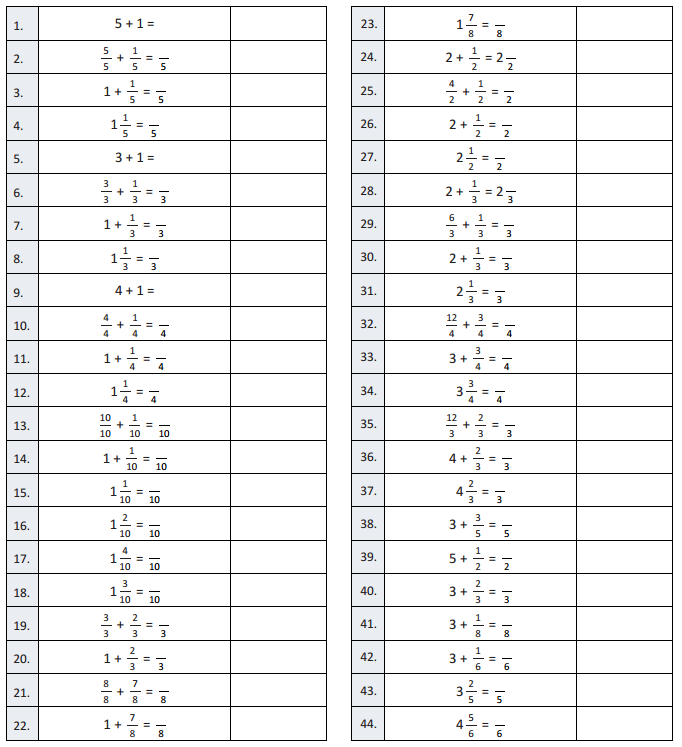
Answer:
5 + 1 = 6, 5/5 + 1/5 = 6/5, 1 + 1/5 = 6/5, 1(1/5) = 6/5, 3 + 1 = 4, 3/3 + 1/3 = 4/3, 1 + 1/3 = 2/3, 1(1/3) = 4/3, 4 + 1 = 5, 4/4 + 1/4 = 5/4, 1 + 1/4 = 5/4, 1(1/4) = 5/4, 10/10 + 1/10 = 11/10, 1 + 1/10 = 11/10, 1(1/10) = 11/10, 1(2/10) = 12/10, 1(4/10) = 14/10, 1(3/10) = 13/10, 3/3 + 2/3 = 5/3, 1 + 2/3 = 5/3, 8/8 + 7/8 = 15/8, 1 + 7/8 = 15/8, 1(7/8) = 15/8, 2 + 1/2 = 2(1/2), 4/2 + 1/2 = 5/2, 2 + 1/2 = 3/2, 2(1/2) = 3/2, 2 + 1/3 = 7/3, 6/3 + 1/3 = 7/3, 2 + 1/3 = 7/3, 2(1/3) = 7/3, 12/4 + 3/4 = 15/4, 3 + 3/4 = 15/4, 3(3/4) = 15/4, 12/3 + 2/3 = 13/3, 4 + 2/3 = 6/3, 4(2/3) = 6/3, 3 + 3/5 = 6/5, 5 + 1/2 = 6/2, 3 + 2/3 = 11/3, 3 + 1/8 = 25/8, 3 + 1/6 = 19/6, 3(2/5) = 17/5, 4(5/6) = 29/6.
Explanation:
In the above-given question,
given that,
change mixed numbers to fractions.
5 + 1 = 6, 5/5 + 1/5 = 6/5, 1 + 1/5 = 6/5, 1(1/5) = 6/5, 3 + 1 = 4, 3/3 + 1/3 = 4/3, 1 + 1/3 = 2/3, 1(1/3) = 4/3, 4 + 1 = 5, 4/4 + 1/4 = 5/4, 1 + 1/4 = 5/4, 1(1/4) = 5/4, 10/10 + 1/10 = 11/10, 1 + 1/10 = 11/10, 1(1/10) = 11/10, 1(2/10) = 12/10, 1(4/10) = 14/10, 1(3/10) = 13/10, 3/3 + 2/3 = 5/3, 1 + 2/3 = 5/3, 8/8 + 7/8 = 15/8, 1 + 7/8 = 15/8, 1(7/8) = 15/8, 2 + 1/2 = 2(1/2), 4/2 + 1/2 = 5/2, 2 + 1/2 = 3/2, 2(1/2) = 3/2, 2 + 1/3 = 7/3, 6/3 + 1/3 = 7/3, 2 + 1/3 = 7/3, 2(1/3) = 7/3, 12/4 + 3/4 = 15/4, 3 + 3/4 = 15/4, 3(3/4) = 15/4, 12/3 + 2/3 = 13/3, 4 + 2/3 = 6/3, 4(2/3) = 6/3, 3 + 3/5 = 6/5, 5 + 1/2 = 6/2, 3 + 2/3 = 11/3, 3 + 1/8 = 25/8, 3 + 1/6 = 19/6, 3(2/5) = 17/5, 4(5/6) = 29/6.
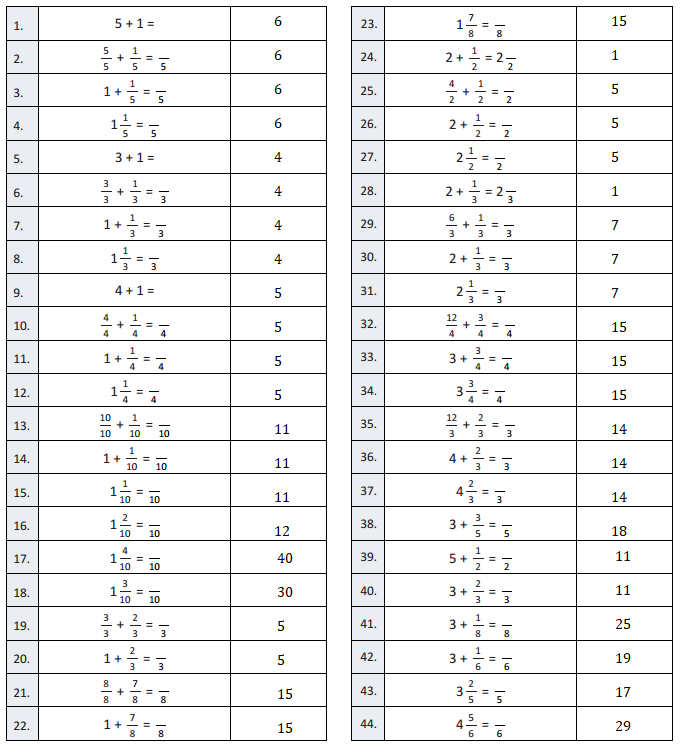
Question 1.
5 + 1 = 6.
Answer:
6 = 5 + 1.
Explanation:
In the above-given question,
given that,
change mixed numbers to fractions.
6 = 5 + 1.
5 + 1 = 6.
Question 2.
\(\frac{5}{5}\) + \(\frac{1}{5}\) = \(\frac{4}{5}\)
Answer:
5/5 = 1/5 + 4/5.
Explanation:
In the above-given question,
given that,
change mixed numbers to fractions.
5/5 = 1/5 + 4/5.
4 + 1 = 5.
1/5 + 4/5 = 5/5.
Question 3.
1 + \(\frac{1}{5}\) = \(\frac{6}{5}\)
Answer:
6/5 = 1 + 1/5.
Explanation:
In the above-given question,
given that,
change mixed numbers to fractions.
6/5 = 1 + 1/5.
5 + 1 = 6.
1 + 1/5 = 6/5.
Question 4.
1\(\frac{1}{5}\) = \(\frac{6}{5}\)
Answer:
6/5 = 1 + 1/5.
Explanation:
In the above-given question,
given that,
change mixed numbers to fractions.
6/5 = 1 + 1/5.
5 + 1 = 6.
1 + 1/5 = 6/5.
Question 5.
3 + 1 = 4.
Answer:
4 = 3 + 1.
Explanation:
In the above-given question,
given that,
change mixed numbers to fractions.
4 = 3 + 1.
3 + 1 = 4.
Question 6.
\(\frac{3}{3}\) + \(\frac{1}{3}\) = \(\frac{4}{3}\)
Answer:
4/3 = 3/3 + 1/3.
Explanation:
In the above-given question,
given that,
change mixed numbers to fractions.
4/3 = 3/3 + 1/3.
3 + 1 = 4.
1/3 + 3/3 = 4/3.
Question 7.
1 + \(\frac{1}{3}\) = \(\frac{4}{3}\)
Answer:
4/3 = 1 + 1/3.
Explanation:
In the above-given question,
given that,
change mixed numbers to fractions.
4/3 = 1 + 1/3.
3 + 1 = 4.
1 + 1/3 = 4/3.
Question 8.
1\(\frac{1}{3}\) = \(\frac{4}{3}\)
Answer:
4/3 = 1 + 1/3.
Explanation:
In the above-given question,
given that,
change mixed numbers to fractions.
4/3 = 1 + 1/3.
3 + 1 = 4.
1 + 1/3 = 4/3.
Question 9.
4 + 1 = 5.
Answer:
5 = 4 + 1.
Explanation:
In the above-given question,
given that,
change mixed numbers to fractions.
5 = 4 + 1.
4 + 1 = 5.
Question 10.
\(\frac{4}{4}\) + \(\frac{1}{4}\) = \(\frac{5}{4}\)
Answer:
5/4 = 1/4 + 4/4.
Explanation:
In the above-given question,
given that,
change mixed numbers to fractions.
5/4 = 1/4 + 4/4.
4 + 1 = 5.
1/4 + 4/4 = 5/4.
Question 11.
1 + \(\frac{1}{4}\) = \(\frac{5}{4}\)
Answer:
5/4 = 1/4 + 4/4.
Explanation:
In the above-given question,
given that,
change mixed numbers to fractions.
5/4 = 1/4 + 4/4.
4 + 1 = 5.
1/4 + 4/4 = 5/4.
Question 12.
1\(\frac{1}{4}\) = \(\frac{5}{4}\)
Answer:
5/4 = 1/4 + 4/4.
Explanation:
In the above-given question,
given that,
change mixed numbers to fractions.
5/4 = 1/4 + 4/4.
4 + 1 = 5.
1/4 + 4/4 = 5/4.
Question 13.
\(\frac{10}{10}\) + \(\frac{1}{10}\) = \(\frac{9}{10}\)
Answer:
10/10 = 1/10 + 9/10.
Explanation:
In the above-given question,
given that,
change mixed numbers to fractions.
10/10 = 1/10 + 9/10.
9 + 1 = 10.
1/10 + 9/10 = 10/10.
Question 14.
1 + \(\frac{1}{10}\) = \(\frac{11}{10}\)
Answer:
11/10 = 1 + 1/10.
Explanation:
In the above-given question,
given that,
change mixed numbers to fractions.
11/10 = 1 + 1/10.
10 + 1 = 11.
1 + 1/10 = 11/10.
Question 15.
1\(\frac{1}{10}\) = \(\frac{11}{10}\)
Answer:
11/10 = 1 + 1/10.
Explanation:
In the above-given question,
given that,
change mixed numbers to fractions.
11/10 = 1 + 1/10.
10 + 1 = 11.
1 + 1/10 = 11/10.
Question 16.
1\(\frac{2}{10}\) = \(\frac{12}{10}\)
Answer:
12/10 = 1 + 2/10.
Explanation:
In the above-given question,
given that,
change mixed numbers to fractions.
12/10 = 1 + 2/10.
10 + 2 = 12.
1 + 2/10 = 12/10.
Question 17.
1\(\frac{4}{10}\) = \(\frac{14}{10}\)
Answer:
14/10 = 1 + 4/10.
Explanation:
In the above-given question,
given that,
change mixed numbers to fractions.
14/10 = 1 + 4/10.
10 + 4 = 14.
1 + 4/10 = 14/10.
Question 18.
1\(\frac{3}{10}\) = \(\frac{13}{10}\)
Answer:
13/10 = 1 + 3/10.
Explanation:
In the above-given question,
given that,
change mixed numbers to fractions.
13/10 = 1 + 3/10.
10 + 3 = 13.
1 + 3/10 = 13/10.
Question 19.
\(\frac{3}{3}\) + \(\frac{2}{3}\) = \(\frac{1}{3}\)
Answer:
3/3 = 1/3 + 2/3.
Explanation:
In the above-given question,
given that,
change mixed numbers to fractions.
3/3 = 1/3 + 2/3.
2 + 1 = 3.
1/3 + 2/3 = 3/3.
Question 20.
1 + \(\frac{2}{3}\) = \(\frac{5}{3}\)
Answer:
5/3 = 1 + 2/3.
Explanation:
In the above-given question,
given that,
change mixed numbers to fractions.
5/3 = 1 + 2/3.
4 + 1 = 5.
1 + 2/3 = 5/3.
Question 21.
\(\frac{8}{8}\) + \(\frac{7}{8}\) = \(\frac{1}{8}\)
Answer:
8/8 = 7/8 + 1/8.
Explanation:
In the above-given question,
given that,
change mixed numbers to fractions.
8/8 = 1/8 + 7/8.
7 + 1 = 8.
1/8 + 7/8 = 8/8.
Question 22.
1 + \(\frac{7}{8}\) = \(\frac{15}{8}\)
Answer:
15/8 = 1 + 7/8.
Explanation:
In the above-given question,
given that,
change mixed numbers to fractions.
15/8 = 1 + 7/8.
10 + 5 = 15.
1 + 7/8 = 15/8.
Question 23.
1\(\frac{7}{8}\) = \(\frac{15}{8}\)
Answer:
15/8 = 1 + 7/8.
Explanation:
In the above-given question,
given that,
change mixed numbers to fractions.
15/8 = 1 + 7/8.
10 + 5 = 15.
1 + 7/8 = 15/8.
Question 24.
2 + \(\frac{1}{2}\) = 2\(\frac{1}{2}\)
Answer:
5/2 = 2 + 1/2.
Explanation:
In the above-given question,
given that,
change mixed numbers to fractions.
5/2 = 2 + 1/2.
3 + 2 = 5.
2 + 1/2 = 5/2.
Question 25.
\(\frac{4}{2}\) + \(\frac{1}{2}\) = \(\frac{3}{2}\)
Answer:
4/2 = 1/2 + 3/2.
Explanation:
In the above-given question,
given that,
change mixed numbers to fractions.
4/2 = 1/2 + 3/2.
3 + 1 = 4.
1/2 + 3/2 = 4/2.
Question 26.
2 + \(\frac{1}{2}\) = \(\frac{5}{2}\)
Answer:
5/2 = 2 + 1/2.
Explanation:
In the above-given question,
given that,
change mixed numbers to fractions.
5/2 = 2 + 1/2.
3 + 2 = 5.
2 + 1/2 = 5/2.
Question 27.
2\(\frac{1}{2}\) = \(\frac{5}{2}\)
Answer:
5/2 = 2 + 1/2.
Explanation:
In the above-given question,
given that,
change mixed numbers to fractions.
5/2 = 2 + 1/2.
3 + 2 = 5.
2 + 1/2 = 5/2.
Question 28.
2 + \(\frac{1}{3}\) = 2\(\frac{1}{3}\)
Answer:
7/3 = 2 + 1/3.
Explanation:
In the above-given question,
given that,
change mixed numbers to fractions.
7/3 = 2 + 1/3.
5 + 2 = 7.
2 + 1/3 = 7/3.
Question 29.
\(\frac{6}{3}\) + \(\frac{1}{3}\) = \(\frac{7}{3}\)
Answer:
7/3 = 2 + 1/3.
Explanation:
In the above-given question,
given that,
change mixed numbers to fractions.
7/3 = 2 + 1/3.
5 + 2 = 7.
2 + 1/3 = 7/3.
Question 30.
2 + \(\frac{1}{3}\) = \(\frac{7}{3}\)
Answer:
7/3 = 2 + 1/3.
Explanation:
In the above-given question,
given that,
change mixed numbers to fractions.
7/3 = 2 + 1/3.
5 + 2 = 7.
2 + 1/3 = 7/3.
Question 31.
2\(\frac{1}{3}\) = \(\frac{7}{3}\)
Answer:
7/3 = 2 + 1/3.
Explanation:
In the above-given question,
given that,
change mixed numbers to fractions.
7/3 = 2 + 1/3.
5 + 2 = 7.
2 + 1/3 = 7/3.
Question 32.
\(\frac{12}{4}\) + \(\frac{3}{4}\) = \(\frac{9}{4}\)
Answer:
12/4 = 3/4 + 9/4.
Explanation:
In the above-given question,
given that,
change mixed numbers to fractions.
12/4 = 3/4 + 9/4.
9 + 3 = 12.
3/4 + 9/4 = 12/4.
Question 33.
3 + \(\frac{3}{4}\) = \(\frac{15}{4}\)
Answer:
15/4 = 3 + 3/4.
Explanation:
In the above-given question,
given that,
change mixed numbers to fractions.
15/4 = 3 + 3/4.
12 + 3 = 5.
3 + 3/4 = 15/4.
Question 34.
3\(\frac{3}{4}\) = \(\frac{15}{4}\)
Answer:
15/4 = 3 + 3/4.
Explanation:
In the above-given question,
given that,
change mixed numbers to fractions.
15/4 = 3 + 3/4.
12 + 3 = 5.
3 + 3/4 = 15/4.
Question 35.
\(\frac{12}{3}\) + \(\frac{2}{3}\) = \(\frac{14}{3}\)
Answer:
14/3 = 12/3 + 2/3.
Explanation:
In the above-given question,
given that,
change mixed numbers to fractions.
14/3 = 12/3 + 2/3.
12 + 2 = 14.
2/3 + 12/3 = 14/3.
Question 36.
4 + \(\frac{2}{3}\) = \(\frac{14}{3}\)
Answer:
14/3 = 12/3 + 2/3.
Explanation:
In the above-given question,
given that,
change mixed numbers to fractions.
14/3 = 12/3 + 2/3.
12 + 2 = 14.
2/3 + 12/3 = 14/3.
Question 37.
4\(\frac{3}{4}\) = \(\frac{19}{4}\)
Answer:
19/4 = 4 + 3/4.
Explanation:
In the above-given question,
given that,
change mixed numbers to fractions.
19/4 = 4 + 3/4.
17 + 2 = 19.
4 + 3/4 = 19/4.
Question 38.
3 + \(\frac{3}{5}\) = \(\frac{18}{5}\)
Answer:
18/5 = 3 + 3/5.
Explanation:
In the above-given question,
given that,
change mixed numbers to fractions.
18/5 = 3 + 3/5.
16 + 2 = 18.
3 + 3/5 = 18/5.
Question 39.
5 + \(\frac{1}{2}\) = \(\frac{11}{2}\)
Answer:
11/2 = 5 + 1/2.
Explanation:
In the above-given question,
given that,
change mixed numbers to fractions.
11/2 = 5 + 1/2.
10 + 1 = 11.
5 + 1/2 = 11/2.
Question 40.
3 + \(\frac{2}{3}\) = \(\frac{11}{3}\)
Answer:
11/2 = 5 + 1/2.
Explanation:
In the above-given question,
given that,
change mixed numbers to fractions.
11/2 = 5 + 1/2.
10 + 1 = 11.
5 + 1/2 = 11/2.
Question 41.
3 + \(\frac{1}{8}\) = \(\frac{25}{8}\)
Answer:
25/8 = 3 + 1/8.
Explanation:
In the above-given question,
given that,
change mixed numbers to fractions.
25/8 = 3 + 1/8.
20 + 5 = 25.
3 + 1/8 = 25/8.
Question 42.
3 + \(\frac{1}{6}\) = \(\frac{19}{6}\)
Answer:
19/6 = 3 + 1/6.
Explanation:
In the above-given question,
given that,
change mixed numbers to fractions.
19/6 = 3 + 1/6.
10 + 9 = 19.
3 + 1/6 = 19/6.
Question 43.
3\(\frac{2}{5}\) = \(\frac{17}{5}\)
Answer:
17/5 = 3 + 2/5.
Explanation:
In the above-given question,
given that,
change mixed numbers to fractions.
17/5 = 3 + 2/5.
10 + 7 = 17.
3 + 2/5 = 17/5.
Question 44.
4\(\frac{5}{6}\) = \(\frac{29}{6}\)
Answer:
29/6 = 4 + 5/6.
Explanation:
In the above-given question,
given that,
change mixed numbers to fractions.
29/6 = 4 + 5/6.
20 + 9 = 29.
4 + 5/6 = 29/6.
Eureka Math Grade 4 Module 5 Lesson 33 Problem Set Answer Key
Question 1.
Write a related addition sentence. Subtract by counting on. Use a number line or the arrow way to help. The first one has been partially done for you.
a. 3\(\frac{1}{3}\) – 1 \(\frac{2}{3}\) = _____
1\(\frac{2}{3}\) + ____ = 3\(\frac{1}{3}\)
Answer:
3(1/3) – 1(2/3) = 1(2/3).
Explanation:
In the above-given question,
given that,
decomposing the fractional part of the number you are subtracting.
3(1/3) – 1(2/3).
2(1/3) – 2/3.
1(2/3).
b. 5\(\frac{1}{4}\) – 2\(\frac{3}{4}\) = __2(2/4)____
Answer:
5(1/4) – 2(3/4) = 2(2/4).
Explanation:
In the above-given question,
given that,
decomposing the fractional part of the number you are subtracting.
5(1/4) – 2(3/4).
3(1/4) – 3/4.
2(2/4).
Question 2.
Subtract, as shown in Problem 2(a), by decomposing the fractional part of the number you are subtracting. Use a number line or the arrow way to help you.
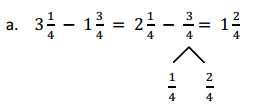
Answer:
3(1/4) – 1(3/4) = 1(2/4).
Explanation:
In the above-given question,
given that,
decomposing the fractional part of the number you are subtracting.
3(1/4) – 1(3/4).
2(1/4) – 3/4.
1(2/4).
b. 4\(\frac{1}{5}\) – 2\(\frac{4}{5}\)
Answer:
4(1/5) – 2(4/5) = 1(2/5).
Explanation:
In the above-given question,
given that,
decomposing the fractional part of the number you are subtracting.
4(1/5) – 2(4/5).
2(1/5) – 4/5.
1(2/5).
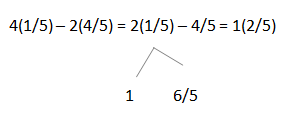
c. 5\(\frac{3}{7}\) – 3\(\frac{6}{7}\)
Answer:
5(3/7) – 3(6/7) = 1(4/7).
Explanation:
In the above-given question,
given that,
decomposing the fractional part of the number you are subtracting.
5(3/7) – 3(6/7).
2(3/7) – 6/7.
1(4/7).
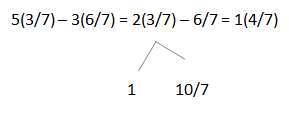
Question 3.
Subtract, as shown in Problem 3(a), by decomposing to take one out.
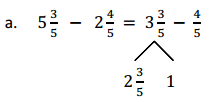
b. 4\(\frac{3}{6}\) – 3\(\frac{5}{6}\)
Answer:
4(3/6) – 3(5/6) = 1(1/3).
Explanation:
In the above-given question,
given that,
decomposing the fractional part of the number you are subtracting.
4(3/6) – 3(5/6).
1(3/6) – 5/6.
1(1/3).
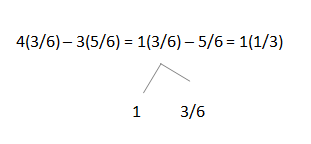
c. 8\(\frac{3}{10}\) – 2\(\frac{7}{10}\)
Answer:
8(3/10) – 2(7/10) = 5(4/10).
Explanation:
In the above-given question,
given that,
decomposing the fractional part of the number you are subtracting.
8(3/10) – 2(7/10).
6(3/10) – 7/10.
5(4/10).
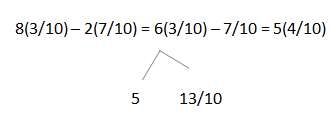
Question 4.
Solve using any method.
a. 6\(\frac{1}{4}\) – 3\(\frac{3}{4}\)
Answer:
6(1/4) – 3(3/4) = 10/4.
Explanation:
In the above-given question,
given that,
subtract the ones first.
6(1/4) – 3(3/4).
6 x 4 = 24.
3 x 4 = 12.
24 + 1/4 = 25/4.
12 + 3/4 = 15/4.
25/4 – 15/4 = 10/4.
b. 5\(\frac{1}{8}\) – 2\(\frac{7}{8}\)
Answer:
5(1/8) – 2(7/8) = 18/8.
Explanation:
In the above-given question,
given that,
subtract the ones first.
5(1/8) – 2(7/8).
5 x 8 = 40.
2 x 8 = 16.
40 + 1/8 = 41/8.
16 + 7/8 = 23/8.
41/8 – 23/8 = 18/8.
c. 8\(\frac{3}{12}\) – 3\(\frac{8}{12}\)
Answer:
8(3/12) – 3(8/12) = 55/12.
Explanation:
In the above-given question,
given that,
subtract the ones first.
8(3/12) – 3(8/12).
8 x 12 = 96.
12 x 3 = 36.
96 + 3/12 = 99/12.
36 + 8/12 = 44/12.
99/12 – 44/12 = 55/12.
d. 5\(\frac{1}{100}\) – 2\(\frac{97}{100}\)
Answer:
5(1/100) – 2(97/100) = 204/100.
Explanation:
In the above-given question,
given that,
subtract the ones first.
5(1/100) – 2(97/100).
5 x 100 = 500.
100 x 2 = 200.
500 + 1/100 = 501/100.
200 + 97/100 = 297/100.
501/100 – 297/100 = 204/100.
Eureka Math Grade 4 Module 5 Lesson 33 Exit Ticket Answer Key
Solve using any strategy.
Question 1.
4\(\frac{2}{3}\) – 2\(\frac{1}{3}\)
Answer:
4(2/3) – 2(1/3) = 7/3.
Explanation:
In the above-given question,
given that,
subtract the ones first.
4(2/3) – 2(1/3).
4 x 3 = 12.
3 x 2 = 6.
12 + 2/3 = 14/3.
6 + 1/3 = 7/3.
14/3 – 7/3 = 7/3.
Question 2.
12\(\frac{5}{8}\) – 8\(\frac{7}{8}\)
Answer:
12(5/8) – 8(7/8) = 30/8.
Explanation:
In the above-given question,
given that,
subtract the ones first.
12(5/8) – 8(7/8).
12 x 8 = 96.
8 x 8 = 64.
96 + 5/8 = 101/8.
64 + 7/8 = 71/8.
101/8 – 71/8 = 30/8.
Eureka Math Grade 4 Module 5 Lesson 33 Homework Answer Key
Question 1.
Write a related addition sentence. Subtract by counting on. Use a number line or the arrow way to help. The first one has been partially done for you.
a. 3\(\frac{2}{5}\) – 1\(\frac{4}{5}\) = ___1(3/5)___
1\(\frac{4}{5}\) + _2/5___ = 3\(\frac{2}{5}\)
Answer:
3(2/5) – 1(4/5) = 1(3/5).
Explanation:
In the above-given question,
given that,
decomposing the fractional part of the number you are subtracting.
3(2/5) – 1(4/5).
2(2/5) – 4/5.
1(3/5).
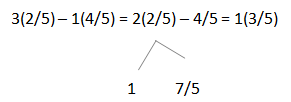
b. 5\(\frac{3}{8}\) – 2\(\frac{5}{8}\)
Answer:
5(3/8) – 2(5/8) = 2(5/8).
Explanation:
In the above-given question,
given that,
decomposing the fractional part of the number you are subtracting.
5(3/8) – 2(5/8).
3(3/8) – 5/8.
2(5/8).
Question 2.
Subtract, as shown in Problem 2(a) below, by decomposing the fractional part of the number you are subtracting. Use a number line or the arrow way to help you.
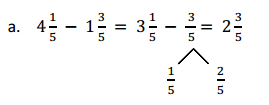
b. 4\(\frac{1}{7}\) – 2\(\frac{4}{7}\)
Answer:
4(1/7) – 2(4/7) = 1(4/7).
Explanation:
In the above-given question,
given that,
decomposing the fractional part of the number you are subtracting.
4(1/7) – 2(4/7).
2(1/7) – 4/7.
1(4/7).
c. 5\(\frac{5}{12}\) – 3\(\frac{8}{12}\)
Answer:
5(5/12) – 3(8/12) = 1(9/12).
Explanation:
In the above-given question,
given that,
decomposing the fractional part of the number you are subtracting.
5(5/12) – 3(8/12).
2(5/12) – 8/12.
1(9/12).

Question 3.
Subtract, as shown in 3(a) below, by decomposing to take one out.
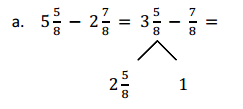
b. 4\(\frac{3}{12}\) – 3\(\frac{8}{12}\)
Answer:
4(3/12) – 3(8/12) = 2(4/12).
Explanation:
In the above-given question,
given that,
decomposing the fractional part of the number you are subtracting.
4(3/12) – 3(8/12).
1(3/12) – 8/12.
2(4/12).
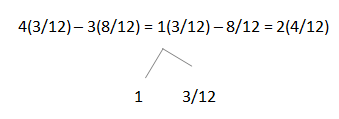
c. 9\(\frac{1}{10}\) – 6\(\frac{9}{10}\)
Answer:
9(1/10) – 6(9/10) = 2(2/10).
Explanation:
In the above-given question,
given that,
decomposing the fractional part of the number you are subtracting.
9(1/10) – 6(9/10).
3(1/10) – 9/10.
2(2/10).
Question 4.
Solve using any strategy.
a. 6\(\frac{1}{9}\) – 4\(\frac{3}{9}\)
Answer:
6(1/9) – 4(3/9) = 16/9.
Explanation:
In the above-given question,
given that,
subtract the ones first.
6(1/9) – 4(3/9).
6 x 9 = 54.
4 x 9 = 36.
54 + 1/9 = 55/9.
36 + 3/9 = 39/9.
55/9 – 39/9 = 16/9.
b. 5\(\frac{3}{10}\) – 3\(\frac{6}{10}\)
Answer:
5(3/10) – 3(6/10) = 17/10.
Explanation:
In the above-given question,
given that,
subtract the ones first.
5(3/10) – 3(6/10).
5 x 10 = 50.
3 x 10 = 30.
50 + 3/10 = 53/10.
30 + 6/10 = 36/10.
53/10 – 36/10 = 17/10.
c. 8\(\frac{7}{12}\) – 5\(\frac{9}{12}\)
Answer:
8(7/12) – 5(9/12) = 34/12.
Explanation:
In the above-given question,
given that,
subtract the ones first.
8(7/12) – 5(9/12).
8 x 12 = 96.
5 x 12 = 60.
96 + 7/12 = 103/12.
60 + 9/12 = 69/12.
103/12 – 69/12 = 34/12.
d. 7\(\frac{4}{100}\) – 2\(\frac{92}{100}\)
Answer:
7(4/100) – 2(92/100) = 412/100.
Explanation:
In the above-given question,
given that,
subtract the ones first.
7(4/100) – 2(92/100).
7 x 100 = 700.
2 x 100 = 200.
700 + 4/100 = 704/100.
200 + 92/100 = 292/100.
704/100 – 292/100 = 412/100.